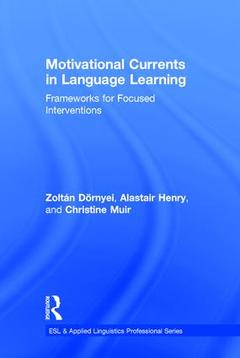Motivational Currents in Language Learning Frameworks for Focused Interventions ESL & Applied Linguistics Professional Series
Auteurs : Dörnyei Zoltán, Henry Alastair, Muir Christine

Building on Zoltán Dörnyei?s authoritative work in the field of learner motivation, this book introduces a new conceptualization?Directed Motivational Currents (DMCs)?and sets out the defining aspects of what they are, what they are not, and how they are related to language learning motivation. Going beyond focused behavior in a single activity, DMCs concern intensive long-term motivation. The distinctive feature of the theory is that it views motivation not simply as a springboard for action but also as a uniquely self-renewing and sustainable process. It is this energizing capacity which distinguishes DMCs from almost every other motivational construct described in the research literature.
Motivational Currents in Language Learning offers new insights, valuable both to motivation researchers and classroom practitioners. The accessible style, along with plentiful illustrations and practical suggestions for promoting sustained learning, invite readers to think about motivation in a different way. Highly relevant for language teachers, teachers-in-training, teacher educators, and researchers in TESOL and applied linguistics, the book explains how the DMC construct can be integrated into course structures and teaching methodologies, and encourages teachers to try out novel methods for harnessing motivational power in classroom settings.
1. Introduction: Three Stories. 2. DMCs Versus Long-Term Motivation: Positioning DMCs Within L2 Motivation Theory. 3. Vistion: The ‘Directed’ Aspects of DMCs. 4. The Launch of a DMC: Shifting into Hyperdrive. 5. The Unique Structure of a DMC: Utilizing ‘Renewable Energy’. 6. Positive Emotional Loading: Eudaimonic Well-Being and Authenticity. 7. When the Current Begins to Wane: The Nature of Effort and the Longer-term Sustainability of DMCs. 8. Introducing ‘Group-DMCs’. 9. Generating DMCs in the Language Classroom.
Zoltán Dörnyei is Professor of Psycholinguistics at the School of English, University of Nottingham, UK.
Alastair Henry is an Associate Professor in language education at University West, Sweden.
Christine Muir is a Postgraduate Teaching Fellow at the School of English, University of Nottingham, UK.
Date de parution : 09-2015
15.2x22.9 cm
Date de parution : 09-2015
15.2x22.9 cm
Thèmes de Motivational Currents in Language Learning :
Mots-clés :
UK Police Force; Zoltán Dörnyei; L2 Motivation Research; Alastair Henry; DMC Pathway; Christine Muir; Polish Music; Directed Motivational Currents; DMC; language learning; Motivational Surges; dynamic systems approach; Self-concordant Goals; motivation; Challenge Based Learning; second language learning; L2 Learning; vision; Freedom Writers Diary; long-term motivation; Motivational Current; intensive group projects; Chronically Accessible; possible selves; Proximal Subgoals; self-concordant groups; Challenge Skill Balance; authenticity; Goal Striving; Zana Ibrahim; Successful Group Project; Progress Checks; Regular Progress Checks; Goal Pursuit; Contingent Path; Big Issue; Affirmative Feedback; Cohesive Learner Group; Autotelic Personality; Project Based Learning



